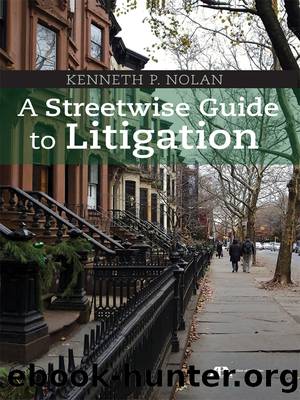A Streetwise Guide to Litigation by Noland Kenneth;Noland Kenneth;

Author:Noland, Kenneth;Noland, Kenneth;
Language: eng
Format: epub
Publisher: American Bar Association
Published: 2013-08-15T00:00:00+00:00
âThe evidence has shown that the negligence of defendant Chase was a substantial factor in Ms. Gomezâs injuries. Now letâs review that evidence and testimony and let me show you how it was a substantial factor. When Iâm finished, I think you will agree that reasonable people will conclude that those negligent actions were a substantial factor. Do you remember the testimony of â¦?â
Submit these to the judge and mark them as an exhibit. Make a record. If the judge doesnât charge what you want, object. When in doubt, object. Object in the conference, object in writing, object in court on the record. Donât be afraid to object, even if the judge screams, âMr. Nolan, you have already objected three times. Youâve made your record. Now, sit down and shut up.â
You donât want to lose on appeal because you failed to object to the charge. Browse any volume of appellate decisions; you will find many where the appellate judges took the easy road and dismissed the appeal because of counselâs failure to objectâin the right way or at the right time. It is not enough simply to say, âI object.â Put on the record exactly what you think should be charged. Insist that the judge make a record of both your objections and of what you want charged. Be persistent, and do not be intimidated.
Your outline must be writtenâbut not read. Your argument must be developedâbut not only in your mind and on paper. Someone has to hear it before the jury does. You and others must listen to how the argument sounds. Donât mouth the words. Say them aloud. Try the argument in front of your mirror and in your car. What you think, in the silent recesses of your mind, that you will say and what you actually say are often totally different. What reads well doesnât necessarily sound good.
Once you have a bit of confidence, practice in front of an audienceâyour spouse or ordinary people like your jurors. Practice before someone who will be honest and has common sense. This generally excludes your partnersâthey may be too arrogant and ignorant of the real world (in other words, too much lawyers) to know good from bad. In New York, itâs the subway test. If they ride the R train to work, they live in the real world and recognize lawyer jive. Bounce your closing off R-train people. They are the jurors.
Toss out the legalese. The average juror watches American Idol, reads the tabloids, roots for da Bears, and has more common sense than the judge does. Speak the language they understand. It is impossible to overestimate how much the sealed environment of college, law school, and years of practice has removed you from how most people talk. What is obvious to you may not be to the jurors.
If you have any doubt whether the jury will understand a word or phrase, practice before someone who did not spend three boring years in law school. Donât use your secretary.
Download
This site does not store any files on its server. We only index and link to content provided by other sites. Please contact the content providers to delete copyright contents if any and email us, we'll remove relevant links or contents immediately.
Objection! by Nancy Grace(1584)
Apeirogon by Colum McCann(1574)
Anatomy of Injustice by Raymond Bonner(1540)
That Every Man Be Armed by Stephen P. Halbrook(1491)
Civil Procedure (Aspen Casebooks) by Stephen C. Yeazell(1452)
The Vaccine Court by Rohde Wayne(1422)
Injustices by Ian Millhiser(1420)
Storytelling for Lawyers by Meyer Philip(1373)
A Practical Guide to International Arbitration in London by Hilary Heilbron(1358)
Restitution by Restitution(1343)
Coercing Virtue by Robert H. Bork(1283)
Tangled Webs: How False Statements Are Undermining America: From Martha Stewart to Bernie Madoff by James B. Stewart(1251)
Broken Scales by Joel Cohen(1250)
The Tools of Argument: How the Best Lawyers Think, Argue, and Win by Joel Trachtman(1235)
INDEFENSIBLE: One Lawyer's Journey Into the Inferno of American Justice by Feige David(1204)
A Matter of Interpretation by Antonin Scalia(1191)
A Religious Orgy in Tennessee by H.L. Mencken(1164)
American Tragedy by Lawrence Schiller & James Willwerth(1151)
Tangled Webs by James B. Stewart(1151)
